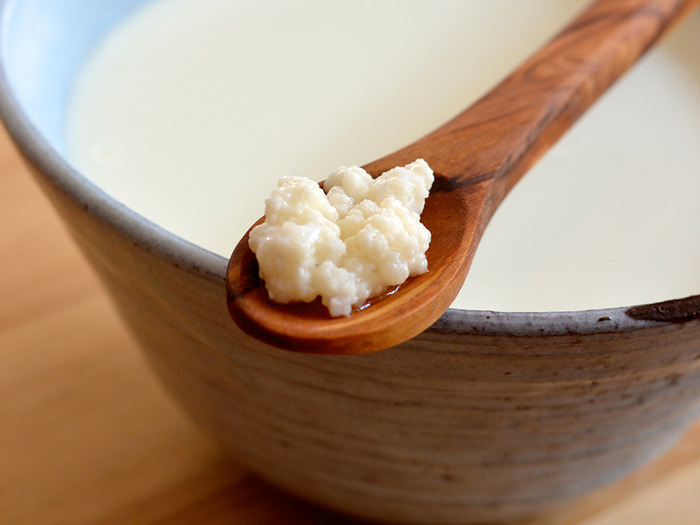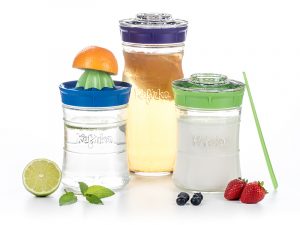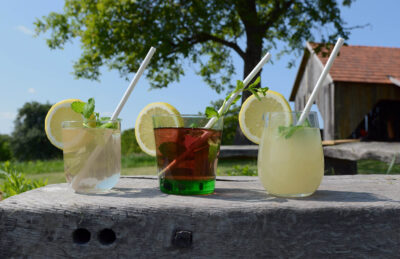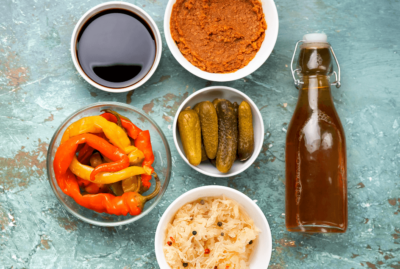Homemade kefir & Vitamins

Kefirko blog is all about homemade kefir and its health benefits. We have already talked about main benefits of kefir for our body, however, we did not go deep into why this is the case. We know kefir is right with probiotics, vitamins, minerals and proteins. Now let’s take a look at what exactly these are.
Understanding nutrition value of our food is important in order to properly balance it. Understanding what our body needs and that we consume can gravelly improve our overall healthy. Abundance or lack of certain nutrition’s can be cause for various disease or even life treating.

In this blog post we will look into what Vitamins we can find in plain kefir. However, we must stress, that these numbers are only an estimation since the amount of each vitamin will depend on the milk and where it came from. Greatly effecting nutrition value of milk and later also kefir are any food processing processes which milk has undergone.
Vitamins in homemade kefir
Below is a list of most common vitamins found in on serving (100g) of kefir:
| Vitamin | Amount in milligrams (mg) |
Amount in percent of recommended daily intake (RDI) |
|
Vitamin A |
0,17mg | 28% |
|
Vitamin B |
0,03mg |
2,2% |
|
Vitamin B2 |
0,14mg |
9% |
|
Vitamin B3 |
0,15mg |
1% |
|
Vitamin C |
0,20mg |
0,3% |
| Vitamin D | 0,02mg |
100% |
| Vitamin E | 0,02mg |
0,2% |
Sources: source 1, source 2, source 3
As we can see, just one serving of kefir can provide our body with significant amount of various vitamins. This will help our body strengthen immune system, regulate digestive system and fight allergens.
At the same time, we must stress that these numbers are only estimations of researchers and are not results of our own work. As we already wrote in the beginning, these numbers warry because of number of thigs. This is especially true for fresh homemade kefir, where fermentation environment is not as highly regulated as it might be in diary processing plants.
Get Kefirko kefir fermenter here.






Thanks for sharing the best article posts they very nice and very help us. I am very satisfied with your site and your posts they very help us. You made a good site and giving us such a good tips and remedies also suggestions they amazing. thank you all
Hello! Thank you for your positive feedback! Here at Kefirko we are very passionate about kefir and fermented cultures in general. We believe in DIY values and kefir is definitely the best and healthiest when it’s homemade. Happy to hear you find our content useful. If you have any topics or questions on this matter, please share them with us, and we will try to cover them in our future posts.
Stay in touch and happy kefiring!
Urška
Hi Kefirko, have You some information about Sugar in Kefir? I found information with 2g per 100ml of kefir. It’s possible ? Thx for post 😉
Hi Carl,
we don’t add sugar into milk, therefore it only contains the “milk sugars” or lactose that is used during the fermentation. When the fermentation is finished there is a very small percentage of these sugars left (less than 1%) but this depends on how long you ferment it. The sugars in milk are the “food” for grains. If there is none left, the grains wont survive for long.
Similar is with water kefir. But there we have to add the sugar to feed the grains. There is a possibility that some sugar is left in water kefir, but you should try as you go until there is none to taste and the kefir is ready. Read more on water kefir recipe on this blog.
Best, Urška
Best News for Vitamin D ever. Vegetarians hurray
Hi there, thanks for commenting!
It’s great to find natural sources for vitamins, kefir is certainly full of them. 🙂
The most important vitamin in keffir is vitamin K2. Strange not to mention it, it’s provided in hardly any foods, keffir and netto soup being the main too.
It acts as a calcium transporter, considering calcium is used in inflammatory responses and then becomes lodged in that area this is hugely important. Keffir then allows the calcium to go where needed…bones and teeth.
Osteoporosis is reduced.
Heart disease risk lessened by moving calcium out of arteries. Brain health improved as calcium mobilised out. All organs benefit.
Very true and well said. K2 (Mk4) is a very important and under appreciated vitamin, that even most ‘healthy’ people are deficient in. Found in high amounts in anything fermented, including cheeses. Also found in certain organs, like liver, as well as egg yolks and butter.
I would like to know whether home made kefir cheese contains more or less of the B vitamins than kefir as most of the whey has been removed.
Hi Hedy, thank you for your question. Removal of whey during the cheese-making process will result in a lower concentration of B vitamins in the final product compared to kefir. B vitamins, such as B2 (riboflavin), B3 (niacin), and B12, are found in both the whey and curded milk. When making kefir cheese, the whey is strained off which means that the final product will contain a lower concentration of B vitamins. But kefir cheese is still a good source of many vitamins and minerals, including calcium and probiotics, which can support overall health and wellness.
Hi, I saw your post and started making kefir for both myself and my dog. It is working wonders for us but the problem is, it works only for 15 days when refrigerated at 4 degrees. Curious to know what all vitamins are in home made kefir from kefir culture, I sent my sample for lab test and was shocked by the range of beneficial bacterias it has. This also made me aware of the fact that on the 17th day, the acidity level of my kefir exceeded beyond the acceptable degrees and so it went bad according to the lab.
I am a travel enthusiast and find it difficult to make it every 15 days. Do you have a remedy to improve its shelf life by say a week. I have already tried freezing it, but that hardly helps.
Thanks!
Hi!
That is quite long. What about making a fresh batch?